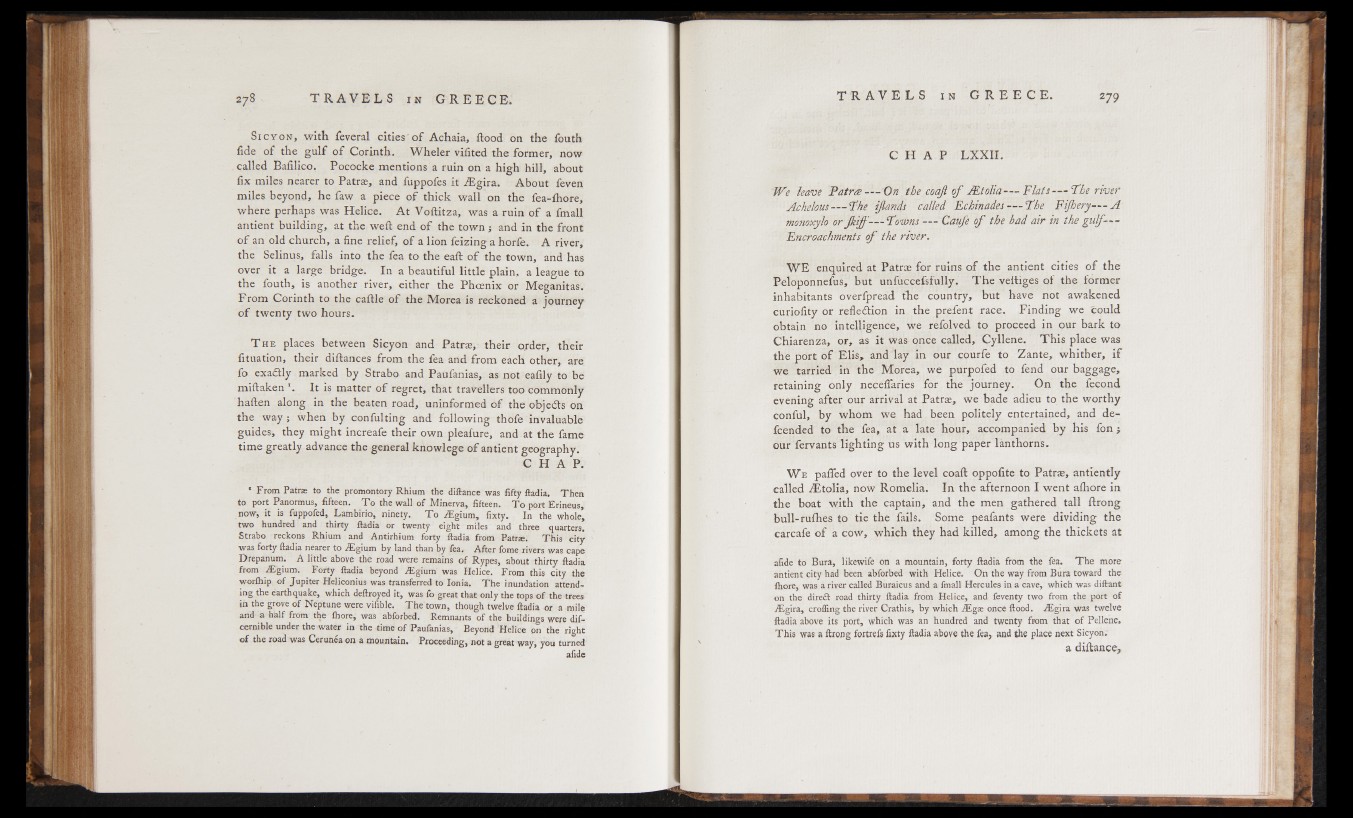
Sicyon, with feveral cities'of Achaia, flood on the fouth
fide of the gulf of Corinth. Wheler vifited the former, now
called Bafilico, Rococke mentions a ruin on a high hill, about
fix miles nearer to Patrae, and fuppofes.it Ægiraw -About feven
miles beyond, he faw a piece of thick wall * on the fea-fhore,
where perhaps was Heliee. At Voftitza, was a ruin of a fmall
an tient building, at the weft end of the town ,* and in the front
o f an old church, a fine relief, o f a lion feizing a horife. A river;
the Selinus, falls into the fea to the eaft of the town, and has
over it a large bridge- In a beautiful little plain, a ieague to
the fouth, is anotherj river,, either the Phoenix or Meganitas.
From Corinth to the çaftle o f the Morea is reckoned a journey
o f twenty two hours.
T he places between Sicyon and Patrae;: their order, their
fituation, their diftances from the fea and'from eâch other, are.
fo exadly marked by Strabo and Paufanias, as not eafily -to be
miftaken \ It is matter o f regret, that trafullers too Oomtnbnly
haften along in the beaten road, uninformed óf the ot^e^ on
the way ; when -by confulting and following thöfe'invaluable
guides* they might increafe their own pleafure, and at the fame
time greatly, advance the general knowlege of antient geography.
C H A P.
* From Patras to the promontory Rhium the diftance was fifty ftadia. Then
to port Panormus, fifteen. T o the wall of Minerva, fifteen. T o port Erineus,
now-, it is fuppofed, Latnbirk), ninety,. T o Ægium, fixty. In the whole,
two hundred and thwty ftadia or twenty eight miles and three quarters.
Strabo reckons Rhium and Antirhium forty ftadia front Patræ. This city
was forty ftadia nearer to Ægium by land than ^y ifea. After fomeriyers was capè
Diépànüm. À little above thé road were remains of Rypes, about rthixty ftadia
from Ægium. Forty ftadia beyond Ægiüîfc' was Heliee. From this city the
worfhipi o f Jupiter Helieonius was transferred to'Ionia. T^e foundation attending
the earthquake, which deftroyed it, was fo great that only the tops Of the trees
ih thé gróve ó f Neptune were vifible. The town, though twelve ftadia or a mile
and a t ó f from thé fhorej was abfbrbed. Remnants of the buiidings were dif-
cemible under the water in the of Paufanias, Beyottd ’Hélice on the right
o f the road was Cerunea on a mountain. Proceeding, not a great way, you turned'
afide
C H A P LXXII.
We ■ leave Fatree-— On the coajl o f Mtolia— Flats—* 'the river
J’-Achilous— F'he ijtarif callef 'jtchinaies — Fhe Fijhery— A
monoxyh^or jk iff— fb^ns — C'aufe i f the had air in the gulf-—
' j Ftndroachmenis fhd fm er.3
W E enquired at Patragfor ruins o f . the antient cities, of .the
Peloponnefus^ but unfuccefsfully. The vefli^es of, the former
inhabitants overfpreacFthe* country, but' have not awakened
curiofity or refledtion in the pmfent .race. Finding we tquld
btjtkin no intelligence, we refolved to proceed in our bark to
Ch.iarenza, or, as it was once called, Cyllene. This place was
tfaf3|ffct of Elis, and'lay in bur Apurle.'to '-Zante, whither, i f
we tarried in the Morea, we purpofed to fend our baggage,
detaining only neeeffaries for the journey. O h the ffcon.4
evening after ourarrivala|Patrae, we bade adieu to the worthy
conful, by whom we had been politely entertained, and de-
feended to the fea, at a late hour, accompanied by his fon;
bli'r fervants lighting its with long paperlinthorns.
W e pafFed over .to the level coaft oppofite to Patrse, antiently
called ADtolia, now Romelia. In the afternoon I went afliore in
the boat with the captain, and the men gathered, tall ftrong
bull-rufties to tie the fiiils. Some peafants were dividing the
cSrcafe of a cow, which they had killed, among the thickets at
afide to Birra, likewUe on a mountain, forty, ftadia from the fea. T h e more
antient city had been abforbed witU Heliee. On the way from Bura toward the
fhore, was a river called Buraicus and a fmall Hercules in a cave,, which was diftant
on .the dire£fc road thirty ftadia from Heliee, and feventy two from, the port of
IEgira, crofting the river Crathis, by which iEgae once flood. ASgira was twelve
ftadia above its port, which was an hundred and twenty from that of Pellene.
This was a ftrong fortrefs fixty ftadia above the fea, and die place next Sicyon;
a diftance,